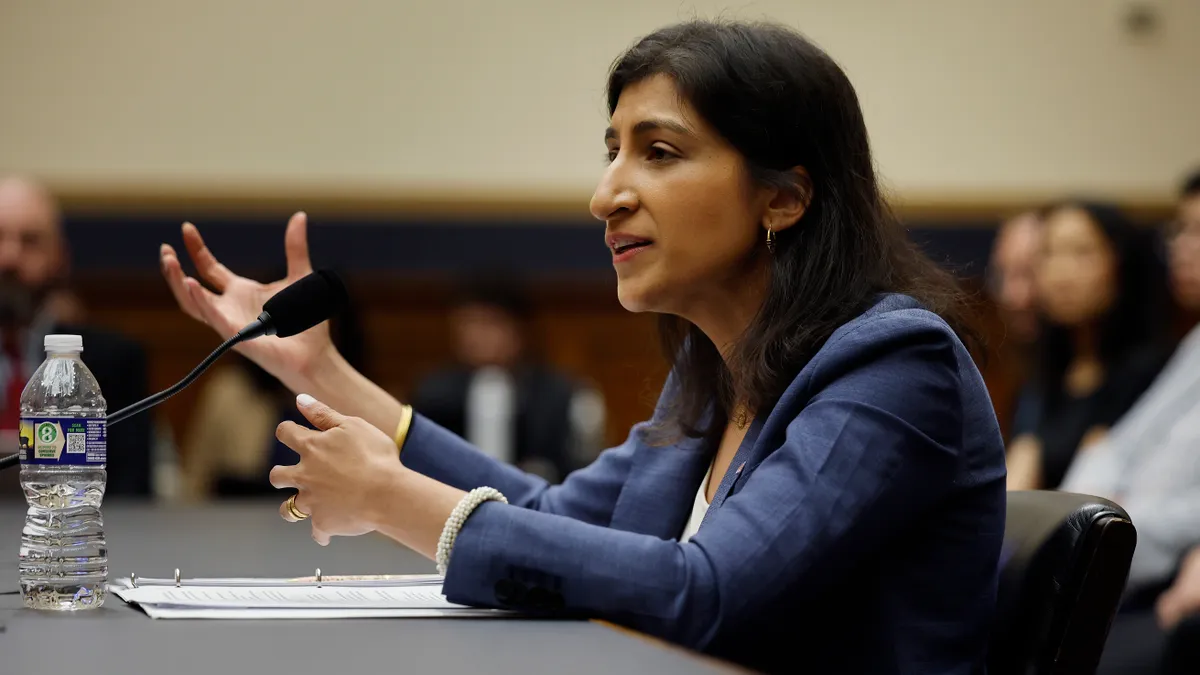Dive Brief:
- The Federal Trade Commission announced Thursday it would approve ExxonMobil’s acquisition of Pioneer Natural Sources, valued at $64.5 billion, but placed a condition on its approval to address antitrust concerns surrounding the deal.
- The regulatory agency barred Pioneer’s founder and former CEO Scott Sheffield from gaining a seat on the new company’s board of directors or serving as an advisor to Exxon following the acquisition over his alleged attempts to collude with the Organization of Petroleum Exporting Countries and its affiliated group, OPEC+.
- The FTC issued a consent order the same day which seeks to block Sheffield from “engaging in collusive activity that would potentially raise crude oil prices, leading American consumers and businesses to pay higher prices for gasoline, diesel fuel, heating oil and jet fuel,” according to a release from the Commission.
Dive Insight:
The FTC alleged in a separate complaint that the former Pioneer CEO made attempts to collude with representatives from OPEC and OPEC+ through public statements and private communications. Such efforts to machinate oil production included reducing the output of oil and gas which, ultimately, would inflate both the price Americans paid at the pump and the profits Pioneer made, per the agency.
“Mr. Sheffield’s past conduct makes it crystal clear that he should be nowhere near Exxon’s boardroom,” FTC’s Deputy Director of the Bureau of Competition Kyle Mach said in the release. “American consumers shouldn’t pay unfair prices at the pump simply to pad a corporate executive’s pocketbook.”
OPEC and OPEC+ collectively include major oil producing countries such Saudi Arabia, Russia, Iraq, Kuwait and others. The 13 OPEC member countries, along with the 10 countries that are part of the OPEC+ subsidiary, produce around 45.2 million barrels of oil per day, according to a 2022 estimate from the U.S. Energy Information Administration.
The FTC’s proposed consent order also placed restrictions on Exxon’s ability to nominate, designate or appoint any employee or director — except certain named exceptions — from Pioneer to its board for a period of five years. The agency also said the new combined company would also have to comply with certain attestation and reporting obligations laid out in Section 8 of the Clayton Act, which bars the same individual from “serving as an officer or director of two competing corporations.”
Exxon first proposed to acquire Pioneer in October 2023 in an all-stock transaction in a bid to obtain expanded access to drill in the nation’s largest oil field, Texas’ Permian Basin.
The proposed merger, however, was met with much furor from climate activists and politicians alike who alleged the consolidation of the two oil giants infringed on antitrust laws.
A month after the deal was announced, Senate Majority Leader Chuck Schumer and 22 other Senate Democrats wrote to FTC Chair Lina Khan, asking the regulator to inspect both Exxon’s proposal to buy Pioneer and Chevron’s $53 billion proposed purchase of Hess Corp. — two of the fossil fuel industry’s largest proposed acquisitions at the time.
This was followed shortly by a coalition of environmental groups urging the agency to investigate and block both proposed deals. The environmental advocates — which included nonprofits Greenpeace USA, the League of Conservation Voters and Sierra Club — said the mergers were anticompetitive, noting their approval would allow Exxon and Chevron to dominate the market and inflate oil and gas prices for consumers.
The approved merger is the latest fuel consolidation play in the oil field, following a myriad of acquisitions from competing energy majors over the past few months.











